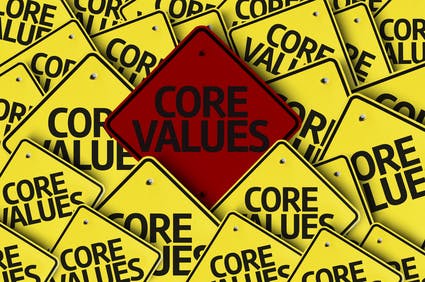In the first chapter of The Power of Thanks, Eric Mosley and I introduce a very important concept that is a foundational principle of the book:
At the heart of great corporate successes and failures is a single observable phenomenon: the behaviors and values that constitute a company’s culture largely determine its fate.”
Of course, we dive much more deeply into why this is true, but to summarize – the values underlying your culture are the defining factors for how all employees should behave to achieve the organizational objectives. They also give employees a sense of greater meaning and context of their work.
Understanding core values = better engagement
There’s no end of research supporting this assertion, and more keeps coming. Since the publication of The Power of Thanks, Don MacPherson, CEO of Modern Survey, wrote about how employee understanding of their company’s core values impacts their own engagement:
When someone says their organizational values are known and understood, that person is 51 times more likely to be ‘fully engaged’ than someone who works at an organization without values that are known…
On Modern Survey’s twice annual study of the U.S. workforce, we ask a very simple question: Does your organization have a clear set of Values that most employees know about and understand?
Respondents are given three choices – Yes, No, Maybe. If you say ‘Yes’ to that question, there is nearly a 20 percent chance you will be ‘fully engaged.’ That’s a significant improvement compared to the 16 percent of ‘fully engaged’ employees across the entire U.S. workforce.
On the other hand, if you say ‘No’ to the values question, it is next to impossible to be ‘fully engaged.’ In fact, just one in 260 people who responded ‘No’ are ‘fully engaged.’ That is less than one-half of one percent!” (all emphasis original)”
That is a powerful finding. If you’re employees don’t know your core values, it’s nearly impossible for them to be fully engaged.
The ROI of employee engagement
If you’re a skeptic asking, “so what?”, the research is equally powerful on the bottom line impact of employee engagement. One recent study from Aon Hewitt showed that every incremental percentage point increase in employee engagement resulted in 0.6 percent of sales growth. The example shared in that study was quite compelling:
For example, a $5 billion organization with a gross margin of 55 percent and operating margins of 15 percent increased operating income by $20 million with just a 1 percent improvement in employee engagement. With a 5 percent improvement in employee engagement, operating income jumped to $102 million.”
That’s a lot of money to leave on the table simply because your employees don’t know or understand your core values. And having employees carry your values on a wallet card or attached to their security badge isn’t the answer. At best, that means they might be able to recite your values when asked.
No, the most effective way to deeply embed your company values into the hearts, minds and daily work of all employees is to recognize them – and have them recognize each other – every time they demonstrate one of your values in their work. That’s what makes your values real.
For example, “Integrity” is a common value at many companies, as it should be. But it can also be a bit philosophical for employees – “I know I’m a person of integrity, but what exactly does that mean in my day-to-day tasks?”
The power of thanks
If you were to recognize an employee with a specific, detailed message like this, think how it might encourage repeat behaviors and increase the employee’s engagement in their work and your company:
Sean, I noticed your work on the Millersville project. The client contact came to you with a very difficult scenario, and they initially seemed unwilling to listen to our proposed solutions. The way you presented options to the customer, clearly outlining why some were more advantageous to them even to our own loss, showed how committed we are to the client’s success. That is a clear demonstration of our core value of ‘Integrity,’ and I and the team appreciate how you handled the situation. Thank you!”
That’s the power of thanks – and it can directly impact your bottom line.
What are your company’s core values? Are all employees in your organization aware of them and committed to living them out in their daily work?
You can find more from Derek Irvine on his Recognize This! blog.
